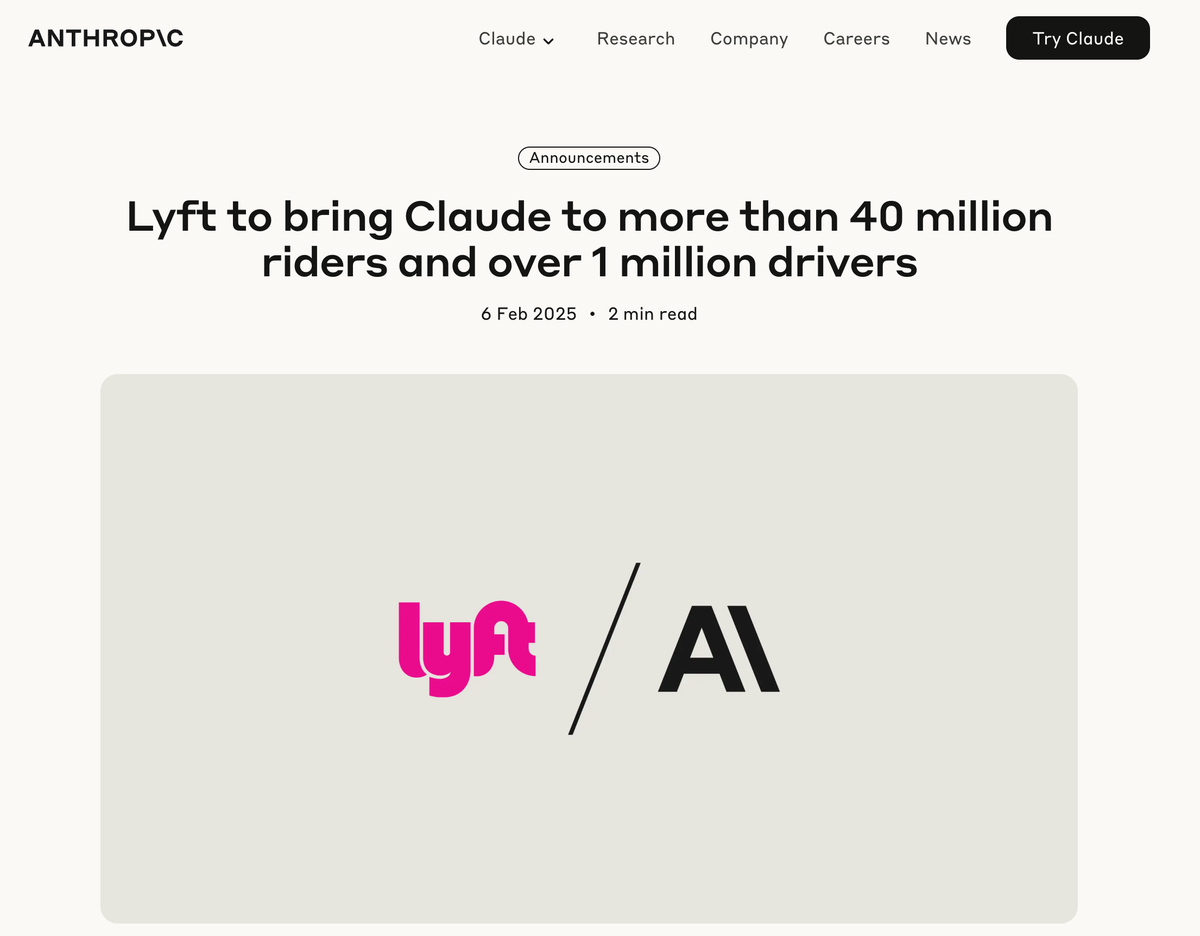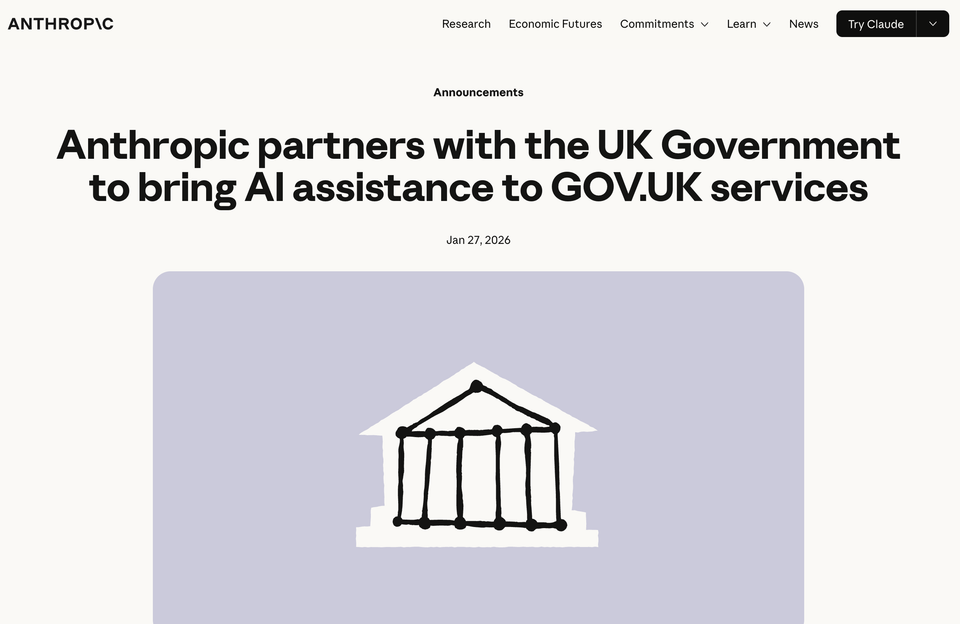Lyft is using Anthropic’s Claude to power their chatbot, that’s bad news if you’re a CAI vendor

I’ve seen this movie before, dear reader.
I watched the transformation of the mobile industry from a world where Nokia‘s one-million-phones-a-day position of absolute power was eroded, gradually and then suddenly, by the next generation of players.
The executives at Nokia just could not see it.
They had fabulous relationships with their customers.
They had an enormous position of power in every market, in every country.
Occasionally, other manufacturers like Samsung or Motorola (et al.) would claim a slightly better market penetration in some countries for some devices.
Nokia’s customers, by the way, were not you or me. Their customers were the mobile operators. That’s who they were listening to. That’s who they were focusing on, naturally. One deal with a big operator in a single country could shift a million+ units.
I chronicled it all on my site, mobileindustryreview.com (I still write there now and again).
Now, let’s fast forward to the Conversational AI industry. The dynamics are somewhat different, of course.
But the basic hallmarks are there.
Many of the Conversational AI vendor senior executives I’m speaking to aren’t seeing the very dangerous writing on the wall.
They’re carrying on.
They’re obsessing over the day-to-day. All for obvious reasons. You need to hit your quarterly target. Of course you do. This is where most of your focus should be. But not all of it.
Many vendors I’m speaking to are reporting their companies in rude health. Rude health. Great results, great outcomes, everything is brilliant!
However. Let’s take a pause and take a step back.
It’s seriously unbrilliant if companies like Lyft are working directly with the likes of Anthropic.
If they’re doing it — and making bold, confident announcements about it — the implications for your business, dear independent Conversational AI vendor, are somewhat ... challenging.
These big bellwether companies such as Lyft (Uber recently tied up directly with OpenAI) carry a serious amount of kudos.
“If they’re doing it, so should we,” goes the thinking I hear expressed from end users of Conversational AI.
This year for example (i.e. in the last 1.5 months) I've had several financial services clients automatically raise their intent to “have a chat with ChatGPT” (they mean OpenAI) as they evaluate their upcoming 2025 and beyond strategies.
They’re looking for long term fixes.
That's why Salesforce, Microsoft and a few others are suddenly on the agenda when it comes to Conversational AI.
The last thing any enterprise wants to do is buy into the ecosystem of an independent Conversational AI vendor that might not be there this time next year.
You can already see the focus in the RFPs shifting slightly. No question (yet) actually uses phrases like, “Are you going to be bought soon?” or “Will you run out of money next year?“
But it's a clear and present risk that many companies are closely considering when they're discussing which vendors to select.
There’s a reason a lot of executives like to ‘buy IBM’ (or similar).
Gone are the days when you absolutely had to hunt around and find a niche player to run you Conversational AI activities.
Gone are the days when you could look past LivePerson because it was a bit old and outdated.
In a turbulent marketplace with so much going on, the likes of LivePerson (i.e. publicly quoted) can feel like a safer choice.
“If Lyft are quite happy going direct to Anthropic, what are we missing?”
That was a quote I heard on a recent conference call a large prospective end-user of Conversational AI, and their big brand consulting partners (I do a lot of advisory to support both external management consultants and end-users of Conversational AI).
The feeling from the consultants was that the client should still be evaluating subject-matter-expert vendors. They listed out a lot of reasons to support this view — mostly summarised as ‘these independent vendors are hyper-specialist, they know what they’re doing, they’re thoroughly experienced dealing with enterprise demands where hallucination is not an option’ and so on.
They client was only half listening.
I think they’d already woken up that morning wanting to do a deal with OpenAI or Anthropic. If I was being a little naughty, I’d suggest the prospect of being able to fly over to the OpenAI office and do the tour-and-photo was more appealing than anything the traditional independent vendors could compete with.
It was also the first time I heard a client say words to the effect of ‘Amazon already solved hallucination’ (Referring to their recent announcements).
What could independent Conversational AI vendors be doing in such a situation? Well, I asked DeepSeek for some bullet point recommendations and then filled in the blanks with my perspective.
So, DeepSeek headers are in bold. My text is underneath...
- Differentiation and Niche Focus
We’re already seeing this with quite a few vendors. I think it's particularly helpful to be considering whether you can own or dominate a particular industry or section of the marketplace so that your lead, your focus, your track record and your reputation are absolutely and overwhelmingly obvious.
This might mean dumping non-core clients and obsessively focusing on one or two (ideally highly profitable) domains.
- Innovation and R&D
So, this is quite an ask. I’m not entirely sure that it’s possible to compete directly with any of the bigger players. But you can be directing your resources to make sure that are doubling or tripling down on your focus area(s) with hyper, hyper focus. Making sure you've developed (and are developing) clear domain-specific capabilities that not even OpenAI could hope to replicate easily is one example.
- Partnerships and Ecosystem
Partnership and ecosystem was for last year. You’re just too late, I reckon. Way too late to be starting now. I still think it’s valid to be constructing relationships and partnerships in the particular niche areas you’re focusing on.
But I think getting a ‘partnership with EY’ or Microsoft or the like… just too late.
Do it for the press release by all means. You never know, maybe you might be surprised.
- Customer-Centric Approach
Yeah I think that’s probably a bit too late. Maybe it’s still got legs. But I think there’s bigger things afoot now.
- Scalability and Performance
I’m not sure you can compete here either.
- Marketing and Branding
This is a big miss for a lot of Conversational AI vendors, even today. They’ve been spending too little for way too long in the context of branding, public relations, investor relations, analyst relations and so on.
Marketing has been targeted at all the wrong areas, constantly. Cost per click nonsense. Leads that are useless. Whitepapers that do nothing. Empty webinar sessions. Constantly obsessing over metrics that don't matter when the likes of Lyft are simply cutting you out and going straight to Anthropic.
I do think there is still a serious opportunity to push the peddle here, especially if you want to work on increasing your valuation for the inevitable roll-up.
- Pricing and Business Model
Hmmm. There are some dynamics here that could be useful, especially for valuation and earn-out potential. I think the real value for this bullet point was back in 2023 and 2024.
- Data Privacy and Security
This can be a very important differentiator, especially for companies that have a deep, deep concern.
- Talent Acquisition and Retention
With limited exception, I think the moves here are likely played out.
- Monitoring and Adaptation
I think this is exceptionally important — make sure you’ve got someone on your team who is actively monitoring what’s moving in the wider markets, constantly. Of course, obsessing over your domain knowledge is important, but also understanding how things are moving in the various ecosystems supporting, involving and surrounding Conversational AI. You need to be on the front foot with everything from the latest client movements to the trends and announcements pouring out of Silicon Valley and beyond. Rapidly adapting to client needs is also a potential focus to tap.
- Funding and Financial Management
Again I think this one is probably largely played out, especially for a lot of the independent vendors you and I can name. I did a few calls recently with several PE houses who were seriously concerned that many of the investors (in Conversational AI companies) they represent had already crossed into “value erosion” territory.
I think there’s still some really good options and moves to play.
The one bullet point that DeepSeek didn’t suggest but I’d like to include is ‘Corporate Strategy’. Or, essentially, starting buying (or continuing to buy) other independent Conversational AI companies right now. Or companies whose IP really boosts your specific offerings and helps build your valuation too.
Buy revenue, buy customers, buy a competitive position.
Buy your niche focus, double down and focus on continuing to dig the moat that will cause the bigger players to want to actually buy you, rather than just simply cherry-pick your customers and let you wither away naturally.
There's another point to consider here and it's about you, dear reader. Today, you've got shares, equity, options or similar in your independent Conversational AI company. You've got your spreadsheet that you consult now and again which shows your number of shares and their strike price. It's already a big number, right? Whoop! Whoop! The challenge is that this value is locked away right now. You need a liquidity event to turn that paper into cash into your pocket.
Let's focus on your pocket for just a moment. Not the investor's pocket.
Many investors in this space don't understand what they're doing or what they've invested in. They aren't able to see the wood from the trees. They can't see what's moving in the marketplace, nor can they value it. They're using old world models, surrounded by a huge amount of assumption padding. And they're being advised by 'technology advisors' who don't know what they're doing. I know this because they're phoning me (and I'm sure, others) to ask me what they should tell their investor clients.
This assumption padding is preventing the investors from making decisions. They assume it's AI. Assume it's all good. Assume that the revenues look pretty good at the moment so.. you know... keep going.
But unfortunately, many investors haven't been giving any more money out to their portfolio companies. Just in case.
It's why you and your colleagues don't have enough money to do anything material. It's why you can't make the big bets you should be making – because your investors aren't really behind you.
Now, I know there are a select few investors actively banging the drum for their companies and management teams. This is good. They're pushing them forward. Making additional resources available to help their companies grow and build value. They are leading from the front – and that's great. But everyone else?
Ask yourself: Does your investor know what they're doing? Give yourself the gift of a true answer, not the one you automatically parrot every day to others.
The key question is this: Are you going to get a pay day?
Or is there a strong, strong likelihood your independent company is going to get bought for cents on the dollar at some point? And if that happens, there will likely be all sorts of preferential rights to ensure the investors get all or most of any proceeds.
How long until we have dozens of Conversational AI zombie companies slowly drifting about the ecosystem? No investor support. No additional revenue. Just slowly dwindling client revenues.
If you can get a good valuation now – and someone is genuinely willing to buy your company – it could well be beneficial to do that now. Or soon.
How are things going to look this time next year?
Yes, your 3-year contracts look bulletproof today. Will they renew?
In 3 years, will your clients be renewing with you?
Or will they be migrating to the dominant player?
If you're absolutely sure the revenues will continue to be brilliant and you've got the right investor support, keep going with all due haste and effort.
But if you're not sure. If you're concerned, ... ask yourself why Lyft didn't do the deal with you.
What could this mean for the longevity of this industry niche, and what does it mean for you personally?
You can read more about Anthropic on the Conversational AI Marketplace.














